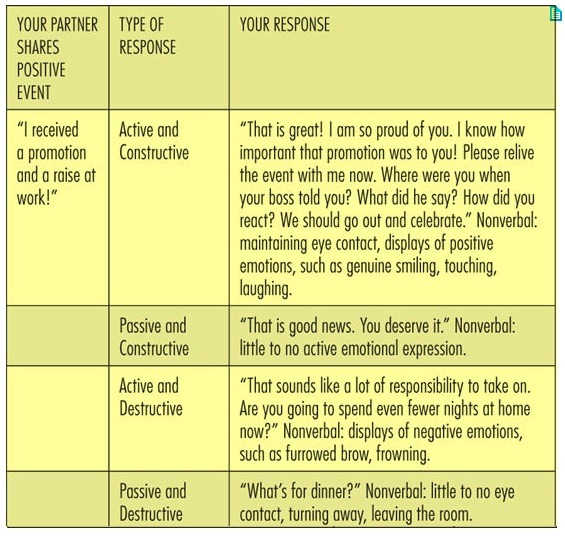
Dale Carnegie’s How to Win Friends and Influence People is the classic on getting along well with others.
But is there any real science behind it, or is it just advice that “sounds good”? In the past I’ve broken down old sayings and career advice, let’s see if Carnegie holds up to scrutiny.
Carnegie listed six ways to make people like you.
Via Wikipedia:
1) “Become genuinely interested in other people.”
Actively showing interest in other people is powerful. Merely listening to what they have to say and ask them to tell you more makes you more liked and people more receptive to your requests.
When people speak, the best responses are both active and constructive. What’s that mean?
It is engaged, enthusiastic, curious and has supportive nonverbal action. Ask questions. Be excited. Ask for details. Smile. Touch. Laugh.
Via Flourish: A Visionary New Understanding of Happiness and Well-being:

2) “Smile.”
Smiling does make you more attractive. And by smiling we influence others to smile. People judge things more positively while smiling, so our own smile can set off a chain reaction causing more positive encounters.
Via Choke: What the Secrets of the Brain Reveal About Getting It Right When You Have To:
The NYU students smiled, on average, a little over once a minute when they were with a smiling confederate and averaged only a third of a smile per minute when they were with a confederate who did not smile. We judge people and objects to be more pleasant when we are smiling in comparison to when we are frowning, so if you want your interviewer to think positively about you, try smiling.
So there’s truth to “when you’re smiling, the whole world smiles with you.”
How can you improve your smile? Smile slower.
3) “Remember that a person’s name is, to that person, the sweetest and most important sound in any language.”
Your name can affect your life dramatically. You are influenced by namessimilar to your own.
In fact, people with the same last name are much more likely to marry each other.
Via Subliminal: How Your Unconscious Mind Rules Your Behavior:
…Smiths marry other Smiths three to five times as often as they marry Johnsons, Williamses, Joneses, or Browns. In fact, Smiths marry other Smiths about as often as they marry people with all those other names, combined.

And, yes, research shows people are more likely to comply with your requests if you remember their name:
Three experiments demonstrate that remembering someone’s name facilitates their compliance with a purchase request made by the rememberer.
4) “Be a good listener. Encourage others to talk about themselves.”
Talking about yourself provides as much pleasure as food or money:
“Self-disclosure is extra rewarding,” said Harvard neuroscientist Diana Tamir, who conducted the experiments with Harvard colleague Jason Mitchell. Their findings were published in the Proceedings of the National Academy of Sciences. “People were even willing to forgo money in order to talk about themselves,” Ms. Tamir said.
5) “Talk in terms of the other person’s interest.”
Obviously, we’re all interested in talking about what interests us — and this engagement promotes liking. When women were more engaged in a conversation on a first date, they were much more likely to report being attracted to the guy.
The more engaged the woman was in the conversation, the better the outcome.
6) “Make the other person feel important – and do it sincerely.”
It’s no surprise that people like to feel important and powerful. Feeling like we’re in control reduces stress:
Steve Maier at the University of Boulder, in Colorado, says that the degree of control that organisms can exert over something that creates stress determines whether the stressor alters the organism’s functioning. His findings indicate that only uncontrollable stressors cause deleterious effects. Inescapable or uncontrollable stress can be destructive, whereas the same stress that feels escapable is less destructive, significantly so.
Money doesn’t increase happiness much, but feeling powerful does. Most people would rather be the big fish in a small pond making $50,000 a year than the small fish in a big pond earning $100,000.
Via The Paradox of Choice: Why More Is Less:
In most cases, more than half of the respondents chose the options that gave them better relative position. Better to be a big fish, earning $50,000, in a small pond than a small fish, earning $100,000, in a big one.
So, yes, there is plenty of science backing up the techniques in How to Win Friends and Influence People.
This piece originally appeared on Barking Up the Wrong Tree.
Join 45K+ readers. Get a free weekly update via email here.
Related posts:
What are the 6 things that can make you dramatically more persuasive?
10 ways science explains why James Bond is so irresistible to women
More Must-Reads from TIME
- Why Trump’s Message Worked on Latino Men
- What Trump’s Win Could Mean for Housing
- The 100 Must-Read Books of 2024
- Sleep Doctors Share the 1 Tip That’s Changed Their Lives
- Column: Let’s Bring Back Romance
- What It’s Like to Have Long COVID As a Kid
- FX’s Say Nothing Is the Must-Watch Political Thriller of 2024
- Merle Bombardieri Is Helping People Make the Baby Decision
Contact us at letters@time.com